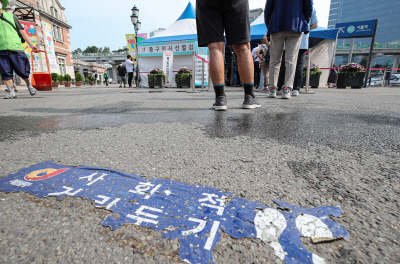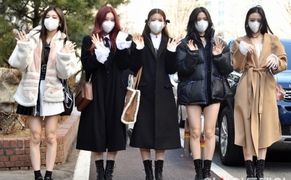 |
| People stand in line to undergo COVID-19 testing at a screening station in front of Seoul Station on July 6, 2021./ Source: Yonhap |
AsiaToday reporter Park Ah-ram & intern reporter Park Wan-joon
Analysts say South Korea is on the start of its fourth wave as it reported the highest ever daily number of COVID-19 cases on Thursday. There are growing concerns that the pandemic could be resurgent this summer when a large number of people are expected to go on vacation amid rising cases of the more contagious Delta variant. Experts suggest preferential vaccination for young adults as a solution.
The highest one-day increase of 1,275 cases were announced on Thursday, according to the Korea Disease Control and Prevention Agency (KDCA), exceeding the number of daily cases reported at the peak of the country’s third wave on December 25, 2020. That brings the nation’s cumulative total to 164,028. The most of the new cases were found in the Seoul metropolitan region.
Amid the COVID-19 vaccination underway, the fourth wave of COVID-19 is even more worrisome because of highly contagious Delta variant cases. Although most of the new cases found in the country is Alpha variant, first identified in the U.K., a growing number of Delta variant is raising concerns.
According to the health authorities and the medical community, the Delta variant combines Alpha with parts of the Epsilon variant. The Delta variant reportedly increases the risk of hospitalization by 2.6 times and critical care admission by 1.6 times compared with the Alpha variant.
The problem is that the delta variant is spreading fast. The detection rate of the Delta variant doubled from a week earlier to 12.7% from 5.8% in the greater Seoul area.
While relatively young people are cited as the major cause of the latest surge, the increase in the detection of the delta variant mainly among those in their 20s and 30s, whose vaccination rate remains low, is also aggravating the difficulty in quarantine efforts. The detection rate surged to 17% recently from 1.8% in the second week of last month.
Health officials predicted that daily virus cases could exceed 2,000 by the end of this month if the situation continues to worsen. “After estimating new infections using mathematical models jointly with private experts, the government forecasts the number of patients at the end of July will be about 1,400 if we maintain the current level,” KDCA commissioner Jeong Eun-kyeong said during a daily briefing. “However, it the current situation worsens, the number may reach 2,140.”
For this reason, there are growing calls for preferential vaccination for young people. “When the nation was undergoing a third wave of pandemic, mass infections were the major cause of the spread. But now, most of the new cases are occurred sporadically. Therefore, we need to block infection among young people,” said Shi Hye-jin, a professor of infectious disease at Gachon University. “Rather than thinking about the order of vaccination by age groups, the government should focus on quickly increasing the vaccination rate,” she said.
#Delta variant #vaccination
Copyright by Asiatoday
Most Read
-
1
-
2
-
3
-
4
-
5
-
6
-
7





















